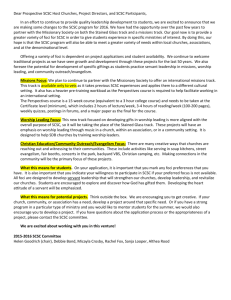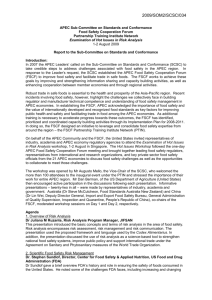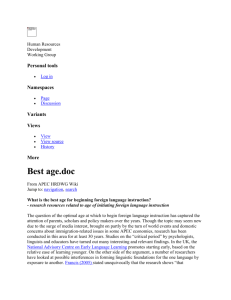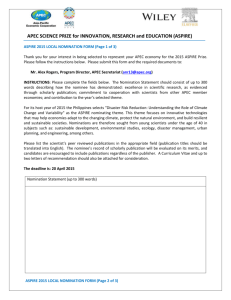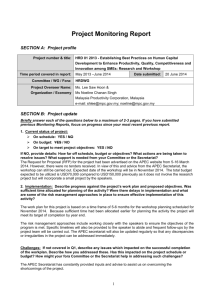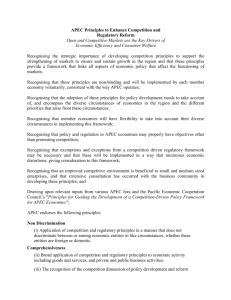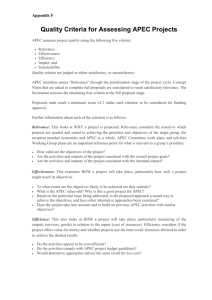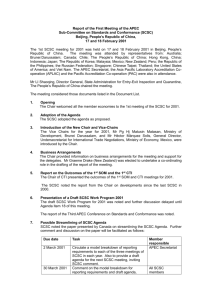APEC
advertisement
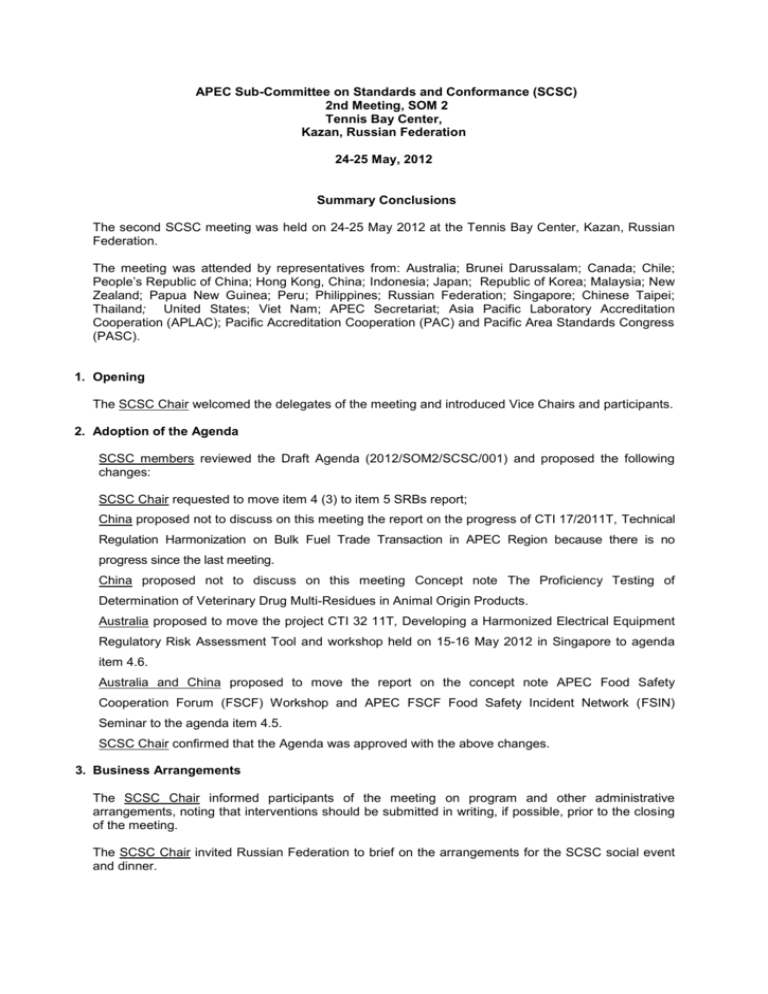
APEC Sub-Committee on Standards and Conformance (SCSC) 2nd Meeting, SOM 2 Tennis Bay Center, Kazan, Russian Federation 24-25 May, 2012 Summary Conclusions The second SCSC meeting was held on 24-25 May 2012 at the Tennis Bay Center, Kazan, Russian Federation. The meeting was attended by representatives from: Australia; Brunei Darussalam; Canada; Chile; People’s Republic of China; Hong Kong, China; Indonesia; Japan; Republic of Korea; Malaysia; New Zealand; Papua New Guinea; Peru; Philippines; Russian Federation; Singapore; Chinese Taipei; Thailand; United States; Viet Nam; APEC Secretariat; Asia Pacific Laboratory Accreditation Cooperation (APLAC); Pacific Accreditation Cooperation (PAC) and Pacific Area Standards Congress (PASC). 1. Opening The SCSC Chair welcomed the delegates of the meeting and introduced Vice Chairs and participants. 2. Adoption of the Agenda SCSC members reviewed the Draft Agenda (2012/SOM2/SCSC/001) and proposed the following changes: SCSC Chair requested to move item 4 (3) to item 5 SRBs report; China proposed not to discuss on this meeting the report on the progress of CTI 17/2011T, Technical Regulation Harmonization on Bulk Fuel Trade Transaction in APEC Region because there is no progress since the last meeting. China proposed not to discuss on this meeting Concept note The Proficiency Testing of Determination of Veterinary Drug Multi-Residues in Animal Origin Products. Australia proposed to move the project CTI 32 11T, Developing a Harmonized Electrical Equipment Regulatory Risk Assessment Tool and workshop held on 15-16 May 2012 in Singapore to agenda item 4.6. Australia and China proposed to move the report on the concept note APEC Food Safety Cooperation Forum (FSCF) Workshop and APEC FSCF Food Safety Incident Network (FSIN) Seminar to the agenda item 4.5. SCSC Chair confirmed that the Agenda was approved with the above changes. 3. Business Arrangements The SCSC Chair informed participants of the meeting on program and other administrative arrangements, noting that interventions should be submitted in writing, if possible, prior to the closing of the meeting. The SCSC Chair invited Russian Federation to brief on the arrangements for the SCSC social event and dinner. The APEC Secretariat provided a comprehensive report on APEC Secretariat activities detailed in 2012/SOM2/SCSC/002 and briefed project update and CNs submission deadline for session 3. 4. SCSC Work Program for 2012 and Related Issues (1) Trade Facilitation Vietnam briefly presented the Final draft CAP 2012. In particular, SCSC members are invited to make comments and provide inputs for completing the Final draft CAP 2012 by sending to Viet Nam before 15 June 2012. Viet Nam should submit the completed CAP 2012 to APEC Secretariat by the end of June 2012. Japan reported on the last WTO/TBT committee, explained Specific Trade Concerns at the last TBT committee and introduced future perspective of TBT committee for the Sixth triennial review which will be adopted in the end of 2012. Indonesia informed SCSC Meeting that since the last SCSC meeting in Moscow, last February 2012, Indonesia has notified 5 technical regulations regulated by The National Food and Drugs authority (BPOM). In addition to these, Indonesia also has notified 19 addenda to the previously notified technical regulations. For more detailed information, please access to the website: http://tbt.bsn.go.id or contact e-mail tbt.indonesia@gmail.com. China and Mexico reported on the developments within the WTO SPS Committee since the last SCSC meeting. (2) Alignment with International Standards Japan reported on the revision of VAP result in 2011 and shared the work program for 2013. Japan stressed the uploading the past presentation materials of VAP in the APEC collaboration system. (3) Cooperation on Technical Infrastructure Development SCSC Chair moved this item to item 5. (4) Good Regulatory Practice Russian Federation introduced the two CTI proposals 2012/SOM2/SCSC/006, “Action Plan on Best Regulatory Practices in APEC economies” and 2012/SOM2/SCSC/007, “Good Regulatory Practices Online Database,” and asked for SCSC members consideration. The United States expressed concern for both the substance of the proposal and the proposed short time for review. While we appreciated the circulation of this CTI document, there was not an adequate time for consultation. We request more time for the consideration of these concepts. In our preliminary view, we are concerned about keeping the terms used in the SCSC consistent in this document, for example, please use Good Regulatory Practice instead of Best Regulatory Practice. We also prefer the term alignment to harmonization when referring to standardization. The United States is not in favor of an approach that creates a 'ladder of standards'. The SCSC and the WTO TBT Committee support the use of international standards. Both international standardization organizations and National Standards Bodies regularly provide training and capacity building on standards. The SCSC has also taken up training on emerging areas of standardization, such as ISO 22000 and ISO 50001. While we appreciate the concept of “Steps to higher standards” as an attempt to provide developing economies levels of options to meet standards is confusing and we are unsure how it relates to implementation of international standards. Finally, the United States cannot agree to the topics of acoustic noise regulation and genetically modified biological materials. Canada believes that inclusion of ”acoustic noise” and “genetically modified biological materials” should be removed from the document and suggested that reference to “coherence” should be changed to alignment”. Canada commented that documents review should allow for sufficient time to consult with internal stakeholders before being submitted to SCSC for endorsement. Canada requested clarification of what is meant by “steps to higher standards”. Chile suggested the following: Chile noted that the definition of the proposal is too general and for this reason don’t have clarity about the scope of this document. The proposal mentions harmonization as a step to avoid barriers to trade. Chile expressed that the idea is don’t duplicate work in this matters. Additionally Chile consider the WTO TBT Agreement that encourage members to use the international standards as a basis and also the Agreement recognize the exception where such international standards or relevant parts would be ineffective or inappropriate for different reasons (geological or weather conditions for example). Chile believes that the proposal it’s not clear in terms of the use of harmonization of Technical Standards and Technical Regulation. The Harmonization work will be discussed on the bases of each interesting sectors economies, because the interest in particular sector of one economy, not necessarily represent the interest of the rest of the economies. The important thing is to recognize the different sectors and establish a work program and step to reach the common sectors. Finally Chile expressed that the need to review SCSC terms of reference, because we have a specific points there related to for example good regulatory practices and we think it’s important first strengthen this aspects and then start the work in specific issues as harmonization. Japan reiterated the concern to some points raised by the United States and Canada and asked the Chair to confirm the timeline to develop the two initiatives. Brunei Darussalam raised concern on the terminology used in the paper presented by Russia on GRP, which are not consistent with the terminology used in SCSC and WTO. Brunei Darussalam also highlighted previous APEC Work Program on GRP, in particular the APEC guidelines on GRP and case studies led by Australia in 2000 and work undertaken on GRP, lead by USA in 2011, and that previous work should be referenced to avoid duplication of efforts. New Zealand and Australia echoed comments made by other economies. In consideration of Member`s preliminary comments, the Russian Federation agreed to revise the two proposals and the APEC Secretariat will circulate the revised proposals for Member comments until the 3 of June. (5) Food and Product Safety Australia, on behalf of the co-chairs China and Australia, gave an update of the current, ongoing and proposed activities of the Food Safety Cooperation Forum (FSCF) as detailed in 2012/SOM2/SCSC/009. Subject to funding, the fourth FSCF Workshop and the Food Safety Incident Network (FSIN) seminar will be held in the margins of SOM2 in 2013. The concept note is at 2012/SOM2/SCSC/008. China thanked members for active participation and contribution to APEC FSCF and FSCF PITN which have achieved tremendous progress over years in areas of information sharing and capacity building. Taking this opportunity, China expects members to continue to support future food safety activities, especially the coming 4th FSCF meeting (subject to funding) in Indonesia in 2013. United States expressed concerns with regard to SCSC proposed projects are unlikely to get funded during BMC 2 session. It is important for CTI to support, capacity building projects, such as the food safety related projects, that have a proven global impact to interconnected supply chains. If there is a food safety related incident, food trade stops, and this line of programming is intended to prevent such events. Over the past 5 years, we note the SCSC has conducted 19 food safety related projects with an estimated worth of $3,842,517, of which a little over $500,000 was provided by the TILF. United States hopes that this important initiative within the SCSC continues to receive support. The Chair agreed to note the concerns raised by United States in the SCSC Convenor`s report. 3 United States reported on outcomes of FSCF Partnership Training Institute Network (PTIN) workshop on Export Certification Workshop held April 24-25 in Greenbelt, Maryland, United States. The SCSC endorsed the outcomes found in 2012/SOM2/SCSC/036. United States reported on upcoming APEC FSCF PTIN Laboratory Capacity Building Sub-Regional Trainings for 2012 to be held in Peru, Malaysia, and Vietnam found in 2012/SOM2/SCSC/011. United States directed the APEC Members attention to 2012/SOM2/SCSC/012 and reported on status of Global Food Safety Partnership (World Bank administered multi donor trust fund), and encouraged member donation to the fund. (6) Pathfinder Initiatives EEMRA Pathfinder Initiative Brunei Darussalam on behalf of the JRAC Chair briefed the meeting on the outcomes of the 17th JRAC meeting held on 17-18 May 2012 in Singapore, including progressing the work program on “Developing a harmonized electrical equipment regulatory risk assessment” tools (2012/SOM2/SCSC/013rev1). The meeting noted that in line with the terms of reference for JRAC, Chile would be Chair of JRAC 2013 with Hong Kong, China as the incoming secretary and Indonesia as the host economy for APEC 2013. Australia reported on the outcomes of APEC JRAC workshop on “Developing harmonized electrical equipment regulatory Risk assessment tool” held on 15-16 May 2012 in Singapore (2012/SOM2/SCSC/014). China thanked Brunei Darussalam and Australia for their report of JRAC meeting and the workshop. China sent two participants to the workshop but regretfully unable to attend this JRAC meeting due to budget planning. Nonetheless, China is glad to see that the EEMRA is moving forward, and to note the presence of IECEE. China would like to see continued cooperation between IECEE and APEC SCSC in the mutual recognition of conformity assessment of EE products in future. (7) Standards and Conformance Education Members are invited to update on recent progress in standards education activities in their economies: − − − Indonesia reported on the results of the ICES conference on Innovative Education about Standardization and WSC Academic Day held on 10-11 May 2012 in Bali, Indonesia. Korea will prepare a new project concept note for next APEC education activities including lecturers training and exchange program, etc in early 2013. The new project will be an additional work in conjunction with the completed project on standard education. A starting time of the new project is expected to be May, 2013. Before submitting to CTI, a draft concept note will be circulated throughout the economies to receive constructive comments. Also, Korea will hold a next conference/workshop in line with SCSC2, 2013 in Indonesia. Workshop venue and date will be announced to the economies in SCSC1, 2013 meeting after discussing with Indonesia delegates. United States reported on two standards education initiatives to be conducted in 2012 sponsored by the National Institute of Standards and Technology as detailed in document SCSC/015. (8) Interaction with Business SCSC members to report on business engagement in SCSC activities in 2012. Australia reported on the activities of the World Wine Trade Group (WWTG) as detailed in document 2012/SOM2/SCSC/017. Australia further reported on the recent activities of the Wine Regulatory Forum (WRF) including the preparations for the New Zealand project of the APEC WRF - Public-Private Dialogue: Risk management and certification requirements for regional trade in wine. 5. SRBs report APLAC reported on the ongoing training initiatives to enhance provision of Proficiency Testing within the APEC region and the interaction with regulators observing the evaluation process (2012/SOM2/SCSC/018). PAC extended an invitation to all SCSC members to attend its forthcoming annual meetings in Hong Kong, China to be held in June. PAC also noted that its MLA for Food Safety Management Systems (FSMS) would be launched during the meetings with up to six economies expected to apply. Japan, on behalf of the PASC secretariat, shared information on the upcoming PASC general meeting which will be held on 4th to 8th June in Yeosu, Korea. 6. SCSC Projects SCSC members reported on progress of new and on-going projects not reported elsewhere on the agenda: - Japan implemented a workshop on 21st May at the margin of the APEC 2012/SCSC2 and reported recommendations to promote Supply Chain Visibility found in 2012/SOM2/SCSC/021 and 2012/SOM2/SCSC/032. - United States reported on project S CTI 04 12T (SCSC) - Aligning Energy Efficiency Regulations for ICT Products - Developing a Strategic Approach and plans for the 18 July 2012 workshop to be held in Seoul, Korea, and noted the draft agenda was included in 2012/SOM2/SCSC/034. Members were encouraged to submit their nominations for participants and speakers to the project overseers before the 6th of June deadline. Indonesia and China thanked United States for invitation and informed them on their intention to nominate participants. Chinese Taipei thanked US for conducting this project. As ICT industry is one of the important industries in Chinese Taipei and as a co-sponsor of this project. Chinese Taipei is going to attend the workshop to make contribution. - Peru reported on the progress of CTI 21/2011T, Laboratory Capacity Building for the Determination of Toxic Contaminants in Seafood and the workshop to be held on 18-20 June in Thailand. This project aims to develop laboratory capabilities within the food inspection laboratories in APEC economies in measurement, testing and inspection for contaminants in seafood. It has been delivered by experts from APMP, who worked jointly with SIM, to ensure appropriate traceability, quality and scientific credibility of outcomes for all participating APEC economies. This project aims to create a sound framework for laboratory capacity building involving the principal regional expert bodies to ensure sustainable outcomes as well as to provide a model for future laboratory capacity building activities within APEC. This workshop is the final phase of this project and it will focus on the evaluation of the Results of the Proficiency Test on toxic contaminants on seafood and plan future activities. The invitation has been circulated to economies. Preference will be given to economies that have already participated in the first workshop and the Proficiency Test. Peru thanked Hong Kong, China, Thailand and the other co-sponsors. - Philippines reported on CTI 22 2011T APEC Scientific Seminar Workshop on Food Safety Risk-Benefit Analysis held on 22-24 November 2011. - Russian Federation reported on the progress of CTI 24/2011A, School Feeding Systems in APEC Economies and workshop to be held on 28-29 June 2012, Moscow. As a result of consultations the workshop program was finalized. Plenary session of the first working day will consist of two parts. 5 The first part will be devoted to general issues of global food security and the role of school feeding systems in providing vulnerable population with quality food in sufficient quantities. In a view of recent trends in world economic development and continuing through the Doha Round of WTO negotiations, the agenda includes an issue on the prospects of school feeding programs as a tool to promote economic development, increased trade, agricultural production, processing industry in accordance with the WTO requirements. The relevant presentations will been made by the representatives of International Organizations and Research Institutes. In the second part of the plenary session will be held a short presentation of the research on “School feeding systems in APEC economies” prepared in the framework of the project proposal, as well as country presentations on the national school feeding program of APEC economies. During the second day of the workshop, participants will be divided into two working groups. - United States reported on the results of the Workshop on Regulatory Approaches to Smart Grid Investment/Deployment (project CTI 30 11T), which was held on 16-17 May 2012 in Quebec, Canada on the margins of the World Forum for Energy Regulators (WFER) which was a follow up to the 2011 ARCAM Initiative on Smart Grid Interoperability. The United States thanked Canada and the other co-sponsors for their support of the event. Members endorsed the report and its outcomes of the workshop found in 2012/SOM2/SCSC/033. - Malaysia reported on the workshop APEC – Product Safety Incidents Information Sharing System (CTI 36 11A) held on 23 - 26 April 2012 in Kuala Lumpur, Malaysia and the preparation of the next workshop in July-August 2012. - Russian Federation reported on the results of 9th Conference on Standards and Conformance in the Field of Innovations and Related Good Practices (project CTI 37 11T). 80 participants took part in the conference. The main objectives of the conference included: 1. Exchange information on the standards and conformance activities; 2. Raise the knowledge on the value of standards and conformity assessment through a focus on innovative products such as nanotechnology products and chemical materials and substances; 3. Enhance the development and harmonization of innovation standards and related good practices, leading to achieving the Osaka Action Agenda (OAA) to “align domestic standards with international standards” and “promote good regulatory practice for preparation, adoption and application of technical regulations in the APEC region”; 4. Pave a way for APEC partnership to build up regulatory, legal, and operating frameworks for high quality analysis and assessment of innovative products; 5. Assess opportunities to increase linkages with the business community, non-government and government sector on developing harmonized approaches to standards and knowledge management practices, as well as facilitate information exchange. A special questionnaire was prepared and circulated among economies in advance of the meeting. Unfortunately only three economies have replied (Indonesia, Philippines and Australia). Russian Federation thanked these economies. The Russian Federation introduced the draft recommendations from the conference contained in the document 2012/SOM2/SCSC/038. Members will have the opportunity to make comments on the draft recommendations until 30th June to the APEC Secretariat. The Russian Federation will submit the final report by the 30th of August, 2012. Japan proposed to exclude the sentence initiating the establishment of nano-producers` association in the draft recommendation. - PAC reported on the current status of MLA readiness project in GHG verification/validation (CTI38/11T) as outlined in the document 2012/SOM2/SCSC/025. PAC noted that due to the success of the project to date, it was planned to launch the MLA six months early in June during the annual meeting. Chinese Taipei thanked economies which participated in the second training workshop on GHG for accreditation bodies for their effort to contribute to this event. There were 25 participants and 4 trainers, most from accreditation bodies participating in the training workshop on GHG for accreditation bodies. The participants were from 14 APEC Economies, including China, Papua New Guinea, Vietnam, Korea, Indonesia, Malaysia, Hong Kong, China, Brunei Darussalam, Singapore, Philippines, Thailand, Mexico and Peru, and Chinese Taipei. We believe this event was helpful to exchange information on practice experience among economies and to facilitate understanding on GHG related standards. We also believe the training workshop was useful for APEC members in establishing GHG accreditation scheme and facilitating PAC GHG MLA. - United States reported on the progress of the IPEG`s CTI 33 11T (IPEG) – APEC / IPEG Workshop on Policies and Practices relating to IPR and Standards contained in 2012/SOM2/SCSC/033, and invited members to consider of sending participants or nominating speakers to the event which will be held in October 2012 in a location to be determined. - New Zealand reported on the APEC Wine Regulatory Forum – Public-Private Dialogue on risk management and certification requirements for regional trade in wine (CTI 06/12T) to be held 5-7 November 2012 in Auckland, New Zealand. SCSC members presented new concept notes that were submitted for BMC 2 approval in 2012 - Indonesia reported on the concept note Best Practices in Educating Food Safety Standards to SMEs; - Regarding to the Concept Note on standards infrastructure establishment, Korea appreciated Vietnam, Malaysia and United States who supported the project as co-sponsor economies. Korea is going to resubmit the CN to session3 in August after revising. Korea requested the members’ comments and more co-sponsorship when we circulate the revised Concept Note to the members in the middle of June 2012; - Korea reported on the concept note Improved Food Inspection Capacity Building based on Risk analysis: Risk-based Food Inspection. - Russian Federation reported on the concept note Framework for APEC Open Technical Dictionary (OTD) in standards regulated spheres. The proposed project will provide member economies with a common methodology and framework for mapping data contained in technical regulations and standards for products and services for key commodity classes. Future projects - Philippines reported on concept note Workshop on the Conduct of Food Safety Impact Analysis (RIA) for APEC Member Economies. The Philippines intended to submit Concept note prior to BMC3 funding session. - United States presented on a proposed Multiyear Project, “The Role of Standards and Conformity Assessment Measures in Enhancing the Performance of the Commercial Building Sector” contained in 2012/SOM2/SCSC/031, and noted the project had an adequate number of co-sponsors to be submitted during the BMC 3 funding session. In response to the United States request, Members endorsed the green buildings project, and agreed to send it forward for CTI endorsement. China, in view of the shrinking funding available for future individual projects, suggested Members to consider the possibility to incorporate individual projects sharing similar goals (for example food safety related projects) into one Multi-Year Project in order to make future SCSC projects tabled at CTI and BMC more competitive. United States supported the comment from China about the possibility of discussion of a multiyear project on food safety and said intersessional discussion would be necessary. Korea subsequently supported China and United States comment on multiyear project on Food Safety with cooperation among the economies to avoid similar or duplicate topics. 7 APEC Secretariat will provide clarifications on competitiveness between multiyear and standard project, the priorities of the projects and project proposal process. 7. Adoption of the SCSC 2 Summary Conclusion 8. Next Meeting Indonesia, as a hosting economy informed about the arrangements for the SCSC 1 meetings in 2013. 9. Other Business 10. Meeting Documents SCSC members considered the public release of documents. 11. Adjournment
